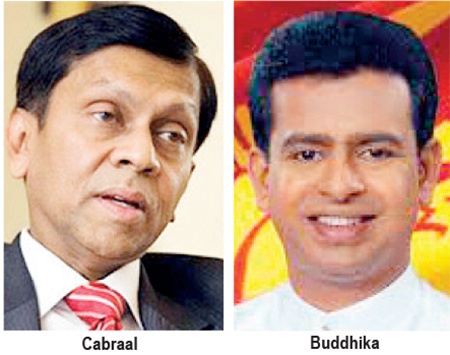News
Cabraal vows to act on SJB MP Pathirana’s revelation of Rs 80 bn revenue loss

By Saman Indrajith
State Minister of Money and Capital Market and State Enterprise Reforms Ajith Nivard Cabraal, on Friday (4) assured Samagi Jana Balavegaya MP Buddhika Pathirana that immediate remedial action would be taken in respect of shocking revelation that some unscrupulous businessmen produced a toxic brew in the name of manufacturing artificial toddy, and corrupt Excise Officers exploited the Technical Crime Report to deprive the government Rs. 80 billion in revenue due.
MP Pathirana:
“The police and the STF commandos raid illicit toddy distilleries amidst hardships, in spite of threats to their lives. Thereafter they hand over their findings to the Excise Officers to take legal action. The Excise Officers do not take the culprits to court, and instead release them filing a Technical Crime Report (TCR). Under the TCR the racketeers only have to pay a skimpy sum by way of a composition fee.”
Pathirana said that as per Sections 49, 50 and 52 of the antiquated Excise Ordinance, the police and the STF had been barred from producing artificial racketeers and their toxic brew in courts. “After the raid, the police and STF have to hand them over to the Excise Department. Not all Excise officers are corrupt; some of them, in fact, produce the lawbreakers in court. Even in such instances the reward money for the detection and raid are not given to the police and the STF; it goes to the Excise officers who handle only the legal part of the raid.”
MP Pathirana called on State Minister of Money and Capital Market and State Enterprise Reforms Ajith Nivard Cabraal to amend Sections 49, 50 and 52 of the Excise Ordinance to enable the police to prosecute those engaged in producing artificial toddy.
The Minister promised that he would get his ministry officials to work on it.
MP Pathirana said that it was the third time he was raising a question on the large-scale racket. “I asked two recent questions from you in this House in the last couple of weeks related to other aspects of this scam. I gathered a lot of facts and details after studying this issue for a considerable time. I also tabled some documents and sent to you copies of them. I also know that your ministry officials are tied up with the budget process, but could you at least appoint a committee to investigate the matters I raised on those two occasions.”
Minister Cabraal:
“I really appreciate the hard work of the MP and I am thankful to him for raising this matter. I have instructed Excise Department officials and the Secretary to the Ministry to commence a thorough study on the matter and report to me. I assure you that I will personally attend to this matter.”
MP Pathirana:
“Since I raised this some of the racketeers have got hold of some Finance Ministry and Excise officials and are working surreptitiously to do away with the mechanisms in place to ascertain information about the toddy industry. Only around one and a half litres of toddy could be extracted from a single coconut palm and it could vary slightly owing to factors such as climate, humidity and season. The amount being sold by the licence holders varies from the actual amount extracted from palms. A difference is in the region of as 60,000-70,000 litres. So, it is obvious that toddy comes from other sources.”
Reading out a document, Minister Cabraal said that it had been mentioned in it that the approved production capacity for each bottled toddy manufacturer would be the total expected toddy yield from the number of trees licensed for tapping.
MP Pathirana:
It is that stipulation that they are trying to do away with. Once it is removed, we may never be able to guess the amount they had illicitly produced. Will you promise to prevent these businessmen and corrupt officials from removing that stipulation?
Minister Cabraal: I apologize for not having a detailed and complete answer today. But I will study this and inform this House of all details in the future date.
Responding to MP Pathirana, the Minister said the toddy industry was found in the districts of Kalutara, Gampaha, Puttalam, Badulla, Moneragala, Hambantota, Anuradhapura and all districts of the Northern and Eastern Provinces. As at Dec 31, last year there had been 3,094 licensed toddy tappers in the country but there was no information about the number of employees engaged in the supportive services of the industry. There were 32 licensed toddy producers in the country as at Dec 31, 2019.
Latest News
Landslide Early Warnings issued to the Districts of Kandy and Nuwara Eliya extended

The landslide early warnings issued to the Districts of Kandy and Nuwara Eliya by the Landslide Early Warning Center of the National Building Research Organisation [NBRO] have been extended until 0600 hrs on the 14th of February 2026.
Accordingly,
The Level II [AMBER] landslide early warnings issued to the Divisional Secretaries Divisions and surrounding areas of Walapane and Nildandahinna in the Nuwara Eliya district and
the Level I [YELLOW] landslide early warnings issued to the Divisional Secretaries Division and surrounding areas of Pathahewaheta in the Kandy district have been extended till 0600AM on Saturday [14]
News
Royal Navy of Oman Vessel “SADH” departs island

The Royal Navy of Oman Vessel “SADH” which arrived in Sri Lanka for replenishment purpose, departed the island on 12 Feb 26.
In accordance with naval tradition, the Sri Lanka Navy extended a customary farewell to the departing ship.
Latest News
“We will not make decisions for rural level schools while sitting in Colombo” – PM

The Minister of Education, Higher Education and Vocational Education Prime Minister Dr. Harini Amarasuriya stated that aligning with the development activities carried out under the new education reforms, decisions at the rural level will not be taken from Colombo and plans should be sent based on the requirements of the rural level through the District Coordination Committees by structural committees. She further noted that all officials, from the Ministry of Education down to the school level, must commit to working efficiently and with a human-centered approach.
The Prime Minister made these remarks while addressing a discussion held with education authorities of the Hambantota District on Thursday [February 12] at the auditorium of the Hambantota District Secretariat regarding the new education reforms and prevailing issues in the education sector.
During the meeting, the Prime Minister provided an opportunity for education authorities including chief prelates of pirivenas, zonal education directors, teacher advisors, and principals to present the challenges they face and officials raised concerns including salary disparities among principals, developing school infrastructure, issues arising from the division between national and provincial schools, and uplifting pirivena education.
Further elaborating, Prime Minister stated:
“The new education reforms were initiated from 2025 through dialogue, consultations, and the collection of necessary data. As officials, you have extended your support to us during this process. We have embarked on a difficult and long journey, and we look forward to your continued cooperation.
We initiated these reforms in response to a strong social demand. Many have attempted such reforms at different times. Within our political vision, we understood clearly that if this country is to be rebuilt, an educational transformation is essential. The human resource is the most valuable resource of this country and it should be nurtured properly.
Solutions to many of the crises our country faces lie within the education system. Addressing the issues in economic challenges, social issues, drug abuse, violence, the breakdown of political culture, corruption, waste, and even the deterioration of human relationships all lie within the education.
In order to achieve the transformation we envision as a government, that an education transformation is necessary.
This education system should focus on reducing the pressures within the system, minimize school dropouts, increase employability, and instill confidence in children about their future.
There are disparities within the school system, between rural and urban schools, national and provincial schools, and difficult schools. This should not happen. All children must have equal opportunities.
Decisions regarding the establishment of schools or expansion of classes should not be political decisions. They must be decisions taken through Structural Committees. Those representatives understand their divisions, village economies, and population dynamics. Based on your decisions and assessments of needs, prepare the plans, discuss them with the District Coordination Committees, and submit them to us. We will then take steps to provide the necessary allocations and other support. We will not make decisions for the rural level while sitting in Colombo.
We are taking steps to minimize salary disparities. A Cabinet paper regarding the salary anomalies of principals has already been prepared for submission. Steps are also being taken to introduce new reforms in pirivena education through the Pirivena Committee of the Ministry of Education. We require the support of the chief prelates in this regard.
A significant number of teachers turn to human rights due to delays caused by inefficiency. Therefore, all officials from the Ministry of Education down to the schools must commit to working efficiently and in a humane manner”
The discussion was attended by Chief prelates of pirivenas, deputy ministers, Members of Parliament, zonal directors, principals, and other education sector officials.


[Prime Minister’s Media Division]
-

 Features6 days ago
Features6 days agoMy experience in turning around the Merchant Bank of Sri Lanka (MBSL) – Episode 3
-

 Business7 days ago
Business7 days agoZone24x7 enters 2026 with strong momentum, reinforcing its role as an enterprise AI and automation partner
-

 Business6 days ago
Business6 days agoRemotely conducted Business Forum in Paris attracts reputed French companies
-

 Business6 days ago
Business6 days agoFour runs, a thousand dreams: How a small-town school bowled its way into the record books
-

 Business6 days ago
Business6 days agoComBank and Hayleys Mobility redefine sustainable mobility with flexible leasing solutions
-

 Business3 days ago
Business3 days agoAutodoc 360 relocates to reinforce commitment to premium auto care
-

 Midweek Review3 days ago
Midweek Review3 days agoA question of national pride
-

 Business7 days ago
Business7 days agoHNB recognized among Top 10 Best Employers of 2025 at the EFC National Best Employer Awards













